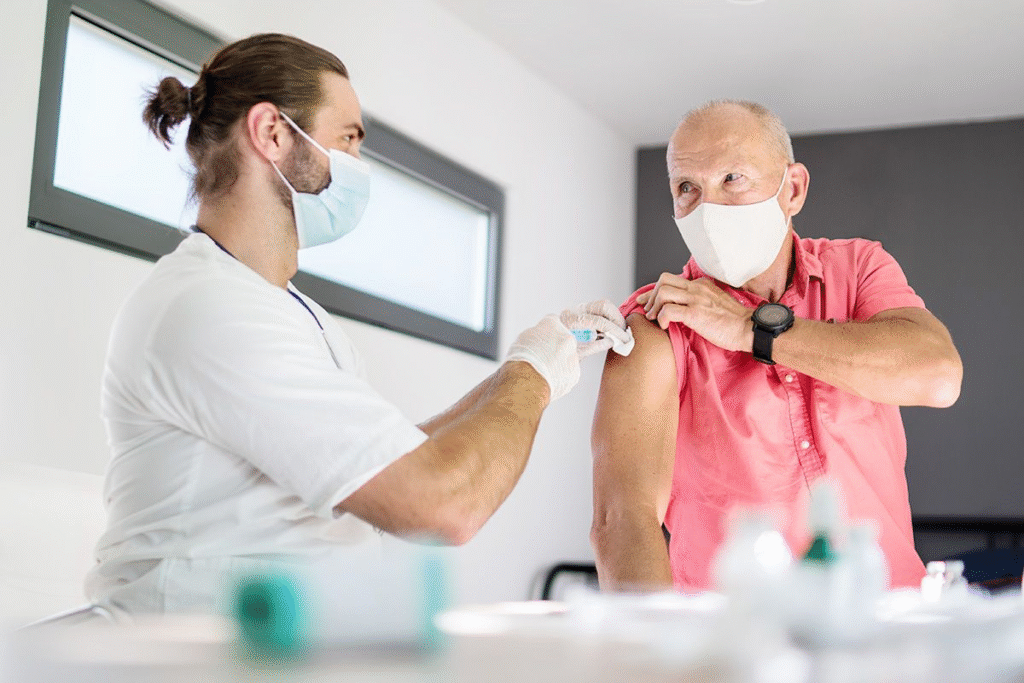Vaccine Coverage Changes Coming to Medicare in 2023

With the passing of the Inflation Reduction Act, the future of Medicare changed. This act of legislation aims to help mitigate health costs for seniors. One of the ways they are doing this is through vaccination efforts.
Starting in 2023, all vaccines on the CDC’s Advisory Committee on Immunization Practices’ list of recommended vaccines will be available with zero copayment costs for Medicare users. We are going to take a deeper look at what vaccines are on that list and how this change will impact your immunization efforts.
Vaccines that were already included in your Part B coverage
Not all the vaccines on this list will be new. For those familiar with Part B vaccine coverage, a few of these will not come as a surprise. However, this a great time to reacquaint yourself with vaccines already available for Part B users.
Influenza vaccines, aka flu shots
Flu shots were already covered by Medicare Part B because influenza can be particularly dangerous for senior citizens. This is a one-shot vaccine given once a year before or during flu season. Flu shots are available at your primary care doctors’ or your local pharmacy.
COVID-19 vaccine and booster
COVID-19 needs no introduction. It has changed the way we view viruses and the spread of germs thanks to the global pandemic. That is why Medicare covers all approved COVID-19 vaccinations and boosters. Seniors are the most at-risk for COVID-19 hospitalizations and death, so access to this vaccine and continued boosters is an essential part of the continued fight against this deadly illness.
Pneumonia vaccine
This one-time vaccine is administered in two doses over a one-year period. This vaccine fights against the bacterium Streptococcus pneumoniae and can help prevent pneumonia, meningitis and sepsis. It is a CDC-recommended vaccination for all adults over 65 and for young children.
Hepatitis B vaccine
Hepatitis B vaccines help prevent infection. For those who have not previously received it, it is a two- to four-dose vaccination administered over the course of six months. It is recommended for those with medium to high risk of infection, including those with diabetes.
Vaccines that will have full coverage starting in 2023
Starting in 2023, many vaccines that had partial coverage on Medicare Part D will now be available to Medicare users with Part B coverage and will not require a copay.
Shingles vaccine
One of the vaccine additions we are most excited about is the inclusion of the shingles vaccine in this new rollout. Shingles is a painful reactivation of chickenpox that can happen at any point in your life after initial infection. Shingles itself is not contagious, although it is possible to get chickenpox from someone with shingles if that person has not yet had chickenpox or received the chickenpox vaccine.
We used to think shingles was a different infection, or a “grown-up” version of chickenpox, but it has been proven to be a reawakening of the illness which remains dormant until that point. 1/3 of adults in the United States will get shingles in their lifetime as the immune system ages and the chance of reactivation increases.
The shingles vaccine is recommended for those over the age of 50, especially if you have had chickenpox earlier in your life. It is a two-shot vaccine delivered over the course of a few months. It is over 90% effective in preventing shingles from occurring in the future.
Tdap vaccine
The Tdap vaccine is a 3 in 1 inoculation against tetanus, diphtheria and pertussis/whooping cough. It is one shot if you have never had the vaccine before, and then you should get a booster every 10 years throughout your life.
Tetanus is a bacterial infection that causes painful muscle contractions, lockjaw and potentially death. Cuts from foreign objects, such metal, push the bacteria into the bloodstream. The infection, once in your body, has no cure. That is why we use boosters to make sure your ability to fight tetanus remains strong; it is 100% preventable with vaccination.
Diphtheria is a serious infection of the nose and throat that is caused by the diphtheria toxin. It causes a thick, gray coating on the back of the throat which obstructs breathing. While antitoxin treatments exist for diphtheria, the best course of action is vaccination. Seniors are identified, along with young children, as those at high risk of diphtheria complications.
Pertussis, also called whooping cough because of the signature “whooping” sound people make when they cough, is a highly contagious respiratory infection. It begins like a bad cold but quickly becomes a severe cough that can last for weeks or months. Antibiotic treatments are available for those who catch it, and it is particularly dangerous for infants.
That’s not all!
Honestly, there are a lot of vaccines on the CDC’s Advisory Committee on Immunization Practices’ list of recommended vaccines, and not all of them are going to apply to everyone. Some might be based on international travel, and some are situationally more important than others. For a full list of vaccinations, please see the CDC website.
The main takeaway is that vaccinations are going to be more affordable for seniors, and that means more people will get inoculated against these serious medical concerns. Increased support for not only treating medical concerns but prevention as well equals well-rounded coverage for all those who rely on Medicare coverage to stay safe.
This content is for informational/educational purposes only, and does not substitute professional medical advice or consultations with healthcare professionals.
Ede’m Now Health Marketplaceis a brand operated by Integrity Marketing Group, LLC and used by its affiliated licensed insurance agencies that are certified to sell Medicare products. Ede’m Now Health Marketplace is not endorsed by the Center for Medicare & Medicaid Services (CMS), the Department of Health and Human Services (DHHS) or any other government agency.
